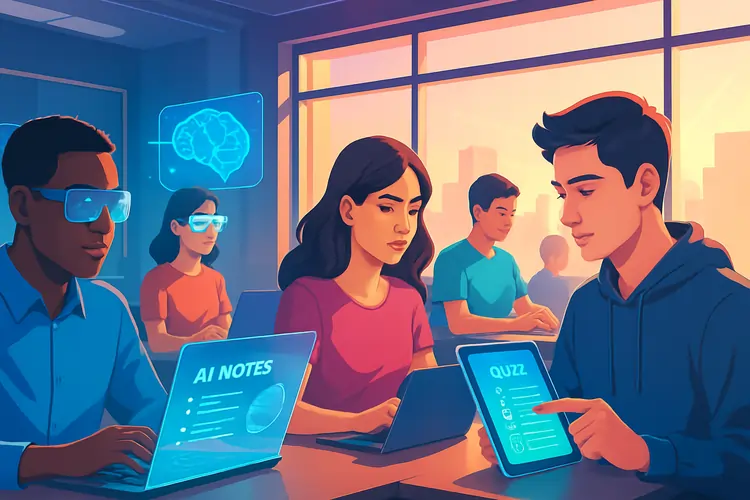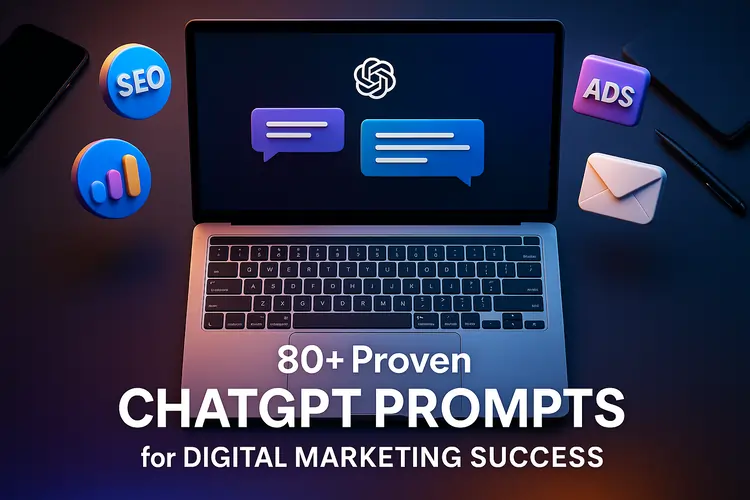Best AI tools for students in 2025 can help you finish assignments in minutes, create flashcards instantly, and even generate custom quizzes. But with so many options available, the real question is — which ones actually work for students in India and worldwide?
At The DM School, we test dozens of AI apps every month. This guide reveals the best AI tools for students in 2025, backed by live SERP intelligence, real user feedback, and fresh research — so you can study smarter, faster, and with confidence.

Live SERP Intelligence: What’s Trending Right Now
📢 Key Updates (August 2025):
- Google AI Pro Plan — Free for eligible students until Oct 6, 2025. Includes Gemini 2.5 Pro, NotebookLM, Veo 3, 2TB storage, and a coding agent “Jules.”
- GPT-5 Study Mode — Adds adaptive quizzes, Socratic questioning, mind maps, and flashcards for personalized learning.
- Lumio AI (India) — Multi-model platform giving access to ChatGPT, Gemini, Claude, Grok, and Perplexity in one interface.
- Khanmigo — AI tutor from Khan Academy, ideal for math, science, and essay guidance.
- Perplexity AI — Research-first AI with citation-backed answers, popular among university students.
“In 2025, the smartest students aren’t working harder — they’re working with AI to accelerate learning without cutting corners.”
Quick takeaway: AI in education has shifted from being a “cheat code” to becoming a legitimate learning assistant — and the latest SERP trends show that tools with guided learning features are dominating the market.
Generative AI Tutors Every Student Should Try in 2025
When it comes to best AI tools for students in 2025, generative AI tutors are leading the pack. These platforms do more than answer questions — they explain concepts, adapt to your pace, and even quiz you for retention.
1. Google Gemini 2.5 Pro (via AI Pro Plan)
Gemini 2.5 Pro is part of Google’s free AI Pro Plan for eligible students until October 6, 2025. It integrates with NotebookLM to summarize PDFs, create mind maps, and suggest study plans. Paired with Veo 3 for video explanations, it’s a powerhouse for visual learners.
2. GPT-5 Study Mode
OpenAI’s GPT-5 Study Mode goes beyond chat — it delivers Socratic questioning, adaptive quizzes, mind maps, and flashcards. Perfect for students who want deeper understanding rather than quick answers. It’s especially useful for preparing for competitive exams in India.
3. Khanmigo (Khan Academy)
Khanmigo is a subject-focused AI tutor from Khan Academy. It can walk you through complex math problems, guide you in essay writing, and even role-play historical debates for better engagement. Teachers can also use it to generate lesson plans.
Gemini 2.5 Pro
- Free for students until Oct 6, 2025
- NotebookLM + Veo 3 integration
- Great for visual learners
GPT-5 Study Mode
- Socratic questioning approach
- Adaptive quizzes & flashcards
- Ideal for competitive exam prep
Khanmigo
- Math, science & writing focus
- Interactive role-play learning
- Teacher tools included
🎯 Mini Case Study:
Priya, a B.Tech student in Bangalore, combined Gemini 2.5 Pro for lecture summaries, GPT-5 Study Mode for practice quizzes, and Khanmigo for tough math topics. In 4 weeks, she cut her study time by 40% while improving her semester GPA.
Quick takeaway: If you want AI to be your study partner, choose a tutor that adapts to your learning style — visual, interactive, or question-based.
Multi-Model AI Platforms for All-in-One Student Access
Some of the best AI tools for students in 2025 aren’t single apps — they’re multi-model platforms that give you access to several top AI systems in one place. This means you can switch between models like ChatGPT, Gemini, and Claude without paying for each individually.
1. Lumio AI (India)
Lumio AI is a home-grown platform from Indore that connects you to multiple AI models — including ChatGPT, Gemini, Claude, Grok, and Perplexity — in one interface. It offers smart model switching based on task type, plus custom AI agent creation for specific subjects like engineering or business studies.
2. Perplexity AI
Perplexity AI is a research-first assistant that provides citation-backed answers — perfect for assignments where plagiarism checks matter. Its conversational search is ideal for deep-dive topics, and it integrates smoothly with browser extensions for instant reference gathering.
3. Education Co-Pilot
Education Co-Pilot is built for students and teachers. It can create lesson plans, quizzes, and assignment templates in minutes, making it an excellent resource for self-paced learners and group study projects.
Lumio AI
- Access to 5+ major AI models
- Custom AI agents for subjects
- Smart model switching
Perplexity AI
- Citation-backed research answers
- Great for plagiarism-safe assignments
- Browser integration for quick use
Education Co-Pilot
- Assignment & quiz creation
- Lesson plan automation
- Good for teachers & students
🔥 Pro Tip:
Use Lumio AI to compare answers from multiple models before finalizing your assignment — this gives you better accuracy and a wider range of perspectives.
Quick takeaway: Multi-model platforms save money, increase flexibility, and help you find the best possible answer for each subject or project.
STEM-Focused AI Tools for Technical Subjects
For students in engineering, science, or mathematics, the best AI tools for students in 2025 are those that go beyond general chat and provide step-by-step solutions with clear reasoning. These STEM-focused platforms help you master problem-solving, not just get the final answer.
1. QANDA (MathGPT + Cramify)
QANDA uses MathGPT to solve equations, explain each step, and offer alternate methods. With its Cramify feature, it generates study notes and flashcards instantly — great for last-minute exam prep.
2. AutoTutor
AutoTutor is a conversation-based learning platform designed for physics, computer literacy, and problem-solving. Instead of dumping answers, it prompts you to think critically through guided questions.
3. Iris (Programming Tutor)
Iris is an AI programming assistant that gives hints, scaffolding, and code improvement tips without handing over the full solution — ideal for learning how to debug and write better code.
QANDA
- Step-by-step math solutions
- Alternate solving methods
- Flashcards via Cramify
AutoTutor
- Physics & computer literacy focus
- Conversation-based learning
- Promotes critical thinking
Iris
- Programming & debugging support
- Code improvement suggestions
- No spoon-feeding of solutions
🔥 Pro Tip:
When using AI for STEM, always review the reasoning behind the answer — this ensures you can apply the concept in exams without AI assistance.
Quick takeaway: The right STEM-focused AI doesn’t just solve problems — it teaches you how to think like an engineer, scientist, or coder.
Research & Summarization Assistants for Faster Studying
For deep research, the best AI tools for students in 2025 help you collect sources, summarize papers, and turn long videos into notes. The goal is simple — read less, retain more.
1) NotebookLM
NotebookLM converts PDFs, docs, and links into outlines, summaries, flashcards, and quick quizzes. Great for exam packs and last‑minute revision notes.
2) Scholarcy
Scholarcy builds a “flashcard” for each paper. You get key findings, methods, and references without wading through 20 pages.
3) Otter & Fireflies (Lecture Capture)
Otter and Fireflies auto‑transcribe classes or study groups. They also summarize action items and highlight difficult topics to revisit.
4) Eightify & TLDR Tools (Video/Text)
Eightify turns long YouTube lectures into bullet summaries. Pair it with a TLDR tool for articles to build concise study notes.
5) Notion AI (Study Hub)
Notion AI helps centralize your notes. Summarize, tag, and link topics so your exam revision becomes a structured plan.
NotebookLM
- Summaries, flashcards, quizzes
- Great for multi‑PDF study packs
- Reduces revision time
Scholarcy
- Flashcard for each paper
- Key results and methods
- Reference extraction
Otter / Fireflies
- Lecture transcription
- Auto summaries & highlights
- Group study notes
📚 The 30‑Minute Paper Method
1) Run Scholarcy → capture results, method, limits.
2) Ask NotebookLM → generate 5 quiz questions.
3) Save to Notion AI → tag by subject and exam.
🎥 Lecture-to-Notes Workflow
1) Record with Otter → get transcript.
2) Use Eightify → summarize key concepts.
3) Build flashcards in NotebookLM.
✅ Pro Tip: Always keep a plagiarism‑safe workflow. Summarize with AI, then rewrite in your words and cite sources. For brand‑safe writing tips, see our SEO Audit Checklist and Blog.
Quick takeaway: Combine a paper summarizer, a lecture transcriber, and a study hub. You’ll compress research hours into focused, test‑ready notes.
Next: Want a ready template to organize AI summaries and flashcards? Book a free consult and we’ll set up your student workspace: Book a Call.
Writing, Proofing & Plagiarism Safety Tools
Strong writing is essential for assignments, projects, and applications. The best AI tools for students in 2025 don’t just correct grammar — they help you express ideas clearly while avoiding plagiarism issues that could harm your academic record.
1) Grammarly
Grammarly checks grammar, style, and tone in real time. Its premium AI rewrite suggestions help you simplify complex ideas without losing meaning — great for thesis statements or research abstracts.
2) Quillbot
Quillbot is popular for paraphrasing, but in 2025, it also includes citation generation and co-writer features. Use it to rephrase in your own style while adding correct references.
3) Copyleaks
Copyleaks detects both plagiarism and AI-generated content. Many universities now use it to check student submissions, so running your work through it first is a smart safety step.
Grammarly
- Grammar & style correction
- Real-time rewrite suggestions
- Improves clarity & tone
Quillbot
- Paraphrasing & summarization
- Built-in citation generator
- Collaborative co-writer mode
Copyleaks
- Plagiarism detection
- AI-content identification
- Used by universities
🔥 Pro Tip: Before final submission, run your work through Grammarly → Quillbot → Copyleaks. This ensures it’s error-free, in your own words, and plagiarism-safe.
Want a plagiarism-safe academic writing checklist we use for client work? Download it from our Blog or Book a Call for a one-on-one walkthrough.
Quick takeaway: AI can improve writing, but you must control the final output. Edit, rephrase, and check for originality before submission.
Creativity & Presentation Tools for Standout Projects
Beyond studying, the best AI tools for students in 2025 also help you create stunning visuals, videos, and presentations that leave an impact. Whether it’s a class project, startup pitch, or portfolio, these tools make your work look professional without advanced design skills.
1) DALL·E (OpenAI)
DALL·E can generate custom images from text prompts — ideal for infographics, diagrams, or creative covers for assignments. The 2025 version integrates directly with ChatGPT for seamless editing.
2) Midjourney
Midjourney specializes in high-quality, artistic visuals. Students in design, architecture, or marketing courses can use it to visualize concepts, product designs, or mood boards.
3) Veo 3 (Google)
Veo 3 creates cinematic-quality videos from short text descriptions. It’s perfect for video presentations, explainer animations, or creative storytelling projects.
4) Canva AI
Canva AI brings design templates, instant text-to-image generation, and presentation auto-formatting together. It’s especially useful for group projects where multiple students collaborate on slides.
DALL·E
- Custom images from prompts
- Integrated with ChatGPT
- Great for diagrams & covers
Midjourney
- Artistic, high-quality visuals
- Ideal for creative courses
- Strong in concept visualization
Veo 3
- Text-to-video creation
- Cinematic output quality
- Great for storytelling
Canva AI
- Presentation automation
- Text-to-image inside slides
- Group collaboration features
🔥 Pro Tip: Pair Veo 3 video intros with Canva AI slide decks for a professional, branded look in group presentations.
Want to learn how we design AI-powered presentations for client pitches? Read our Ad Process Guide or Book a Call with our creative team.
Quick takeaway: Visuals make learning and presenting more engaging. The right AI tool can turn your ideas into eye-catching, professional results in minutes.
How to Choose the Right AI Tool for You
With so many options in this best AI tools for students in 2025 list, the key is matching the tool to your learning style, goals, and subject needs. Here’s a simple framework to make the right choice.
1️⃣ Define Your Goal
Do you want to learn, research, create, or revise? Each goal needs a different toolset.
2️⃣ Match Your Learning Style
Visual learners thrive with Gemini + Veo 3. Analytical thinkers may prefer GPT-5 Study Mode or Perplexity.
3️⃣ Check Integration
Pick tools that connect with your LMS, Google Workspace, or Notion for smoother workflows.
4️⃣ Test for Reliability
Use multi-model platforms like Lumio AI to cross-verify answers for accuracy and bias.
📌 Quick Decision Framework:
- Studying concepts? → GPT-5 Study Mode or Khanmigo
- Doing research? → Perplexity + NotebookLM
- Writing & editing? → Grammarly + Quillbot + Copyleaks
- Creative projects? → DALL·E + Veo 3 + Canva AI
🔥 Pro Tip: Avoid relying on a single AI tool. Mixing two or more ensures you get broader perspectives and fewer errors.
Quick takeaway: The best AI tool is the one that fits your subject, style, and workflow — not just the one with the most features.
Final Thoughts: AI as Your Academic Advantage
The best AI tools for students in 2025 aren’t just shortcuts — they’re skill multipliers. Used wisely, they can save time, deepen understanding, and make your work stand out in exams, projects, and portfolios.
From generative AI tutors that explain complex topics to creative AI tools that make presentations pop, the key is choosing what fits your subject and learning style. Always remember: AI should assist you, not replace your own thinking.
❓ What is the best AI tool for students in 2025?
For all-round use, GPT-5 Study Mode and Google Gemini 2.5 Pro are the top picks — offering explanations, quizzes, and research features in one place.
❓ How can students use AI for studying?
Use AI to summarize notes, generate quizzes, visualize concepts, and check for errors — but always cross-verify facts and add your own insights.
🚀 Next Step: Want a custom AI study toolkit set up for your subjects? Book a free strategy call and we’ll configure it for you in under 30 minutes.
Quick takeaway: AI is your academic edge in 2025 — but the results come from how you use it, not just which tool you choose.


